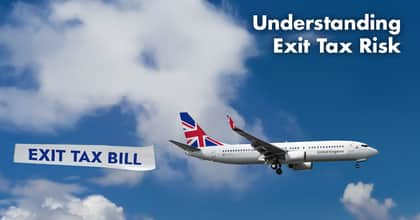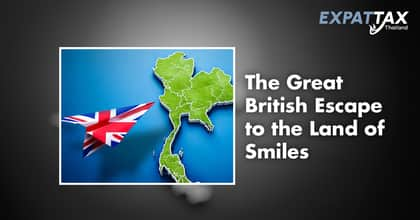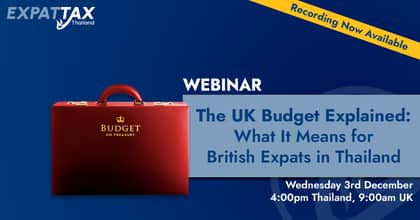Thailand is an increasingly popular destination for Dutch expats, whether for retirement, long-term living or remote work. Thousands of Dutch nationals live in Thailand for at least part of the year, drawn by the warm climate, affordable lifestyle and welcoming communities.
With relocation comes not only responsibility but also opportunity. Understanding how Thai and Dutch tax rules interact is essential — not just to stay compliant, but to make informed choices that can reduce your tax burden. Many assume that leaving the Netherlands ends their tax obligations, or that the so-called ‘180-day rule’ is the only consideration. The reality is far more complex.
The Thailand–Netherlands Double Taxation Agreement (DTA) plays a central role in deciding how income is taxed. It is designed to prevent double taxation, but it does not remove the requirement to file a return in Thailand. Both Thai and Dutch authorities actively share financial information, so knowing the rules is critical. If you are still in the Netherlands and considering a move to Thailand, planning as early as possible can also help you minimise potential liabilities.
This guide explains how Dutch pensions, investments, property income and capital gains are treated, how the DTA applies, and the steps you can take to avoid unnecessary problems.
Are you a Dutch expat in Thailand or planning the move? Book a free call with our team today and get clear answers to your tax questions.
Who This Guide Is For
This guide is written for Dutch nationals residing in Thailand or planning to move there. It will be particularly useful if you:
- Spend significant time in Thailand (180 days or more in a year)
- Receive Dutch pensions or social security benefits
- Own property in the Netherlands and earn rental income
- Hold shares, dividends or investments in the Netherlands
- Run a business or are considering relocation from the Netherlands to Thailand
Common Myths About Dutch Tax Residency
Uncertainty about residency often creates problems for Dutch expats. Here are three of the most common misconceptions:
Myth 1: ‘The 180-day rule decides everything.’
Reality: Thailand uses the 180-day test for tax residency, but the Dutch tax office applies different rules. If you keep strong ties such as property, family, bank accounts or regular visits, you may still be treated as a Dutch resident
Myth 2: ‘If I move abroad, the Dutch tax office can’t touch me.’
Reality: Dutch law can impose exit tax on company shares when you emigrate, taxing even unrealised gains. From 2028, the Box 3 reforms could also tax actual returns. Without proper planning, you may end up taxed in both the Netherlands and Thailand.
Myth 3: ‘Keeping a house or apartment in the Netherlands won’t matter.’
Reality: If a property is available for your use, Dutch authorities may see it as a permanent tie. Even if you live most of the year in Thailand, this can be enough for them to keep you within the Dutch tax net.
Thai Tax Rules for Dutch Expats
Dutch nationals in Thailand are subject to the same tax framework as other expats.
The key points to understand are:
- Tax residency – Spending 180 days or more in Thailand within a calendar year makes you a Thai tax resident. The type of visa you hold does not matter.
- Remitted foreign income – Pensions, dividends, rental income, capital gains and other overseas income become taxable in Thailand if they are remitted, transferred, withdrawn or spent here.
- Domestic income – Any income arising in Thailand, such as local salary or property rental, is always taxable regardless of how long you stay.
- Filing deadlines – The Thai tax year runs from 1 January to 31 December. Annual returns (PND.90 or PND.91) must be filed by 31 March of the following year (with a short extension to early April for online filing). A mid-year return is also required by 30 September for certain income, such as Thai rental property.
How the Thai–Netherlands DTA Works
Thailand and the Netherlands signed their Double Taxation Agreement (DTA) in 1975, and although updates are under discussion, the existing treaty remains in force. The DTA sets out which country has the right to tax different types of income. Its purpose is to prevent double taxation, but it does not exempt you from the requirement to file in Thailand if you are a tax resident.
Here is how the treaty applies in practice:
- Civil service pensions – Taxable only in the Netherlands and exempt in Thailand.
- Other pensions – Taxable in Thailand if remitted by a Thai tax resident, with credits available for Dutch tax already paid.
- Rental income – Property located in the Netherlands is always taxed there, though it must still be reported in Thailand.
- Dividends – Subject to Dutch withholding tax. If remitted to Thailand, they must also be declared there, with foreign tax credits usually available.
- Capital gains – Taxable in Thailand if the proceeds are remitted, based on the full historical gain, even if realised before becoming a Thai resident. This can overlap with Dutch exit taxes, creating a significant risk of double taxation without careful planning.
Dutch Exit Tax: Key Risks when Moving to Thailand
One of the biggest tax risks for Dutch nationals moving to Thailand is the exit tax on company shares. If you own 5% or more of a Dutch company, the tax office treats your emigration as if you sold those shares, taxing the unrealised gain up to the day you leave. This can result in a substantial tax bill, even if you haven’t received any cash.
For moves within the EU/EEA, you usually get automatic deferral of payment. However, for moves to Thailand and other non-EU countries, deferral is not automatic. In most cases, you must provide security (for example, a bank guarantee or Dutch property as collateral) to postpone payment. Without proper planning, some company owners find themselves unable to relocate because they cannot access the cash needed to settle or secure the tax.
The problem doesn’t end there. Thailand taxes capital gains when remitted, based on the full historical gain, not just the gain realised after the move. This means you could face Dutch exit taxation when leaving and Thai taxation when later remitting proceeds, leading to potential double taxation. Careful planning before emigration is therefore essential if you own shares in a Dutch company.
Box 3 Reforms: What Dutch Expats Need to Know
A significant change on the horizon for Dutch taxpayers is the reform of Box 3, the wealth tax on savings and investments. From 2028, the Netherlands will no longer apply a notional or assumed return. Instead, tax will be based on your actual return — including interest, dividends, rental income, and even unrealised increases in the value of assets such as property and shares.
For Dutch nationals moving to Thailand, this matters in three key ways:
- Higher Box 3 liability if still Dutch resident – Because actual returns will be taxed, Dutch residents with certain asset types, such as strong investment portfolios, could face significantly higher annual tax bills.
- Ongoing Dutch taxation of certain assets – Even if you are no longer resident, Dutch property and some Dutch-source assets remain within the scope of Box 3, and value increases will still be taxed.
- Greater risk of double taxation – Thailand taxes remitted gains based on full historical appreciation, while the Netherlands will increasingly tax unrealised growth. Without careful planning, the same wealth can be taxed in both countries.
The proposed tax rate is around 36% on Box 3 income, with a small exemption for the first portion of return. For expats, this means cash flow planning becomes critical. You may need to pay tax on ‘paper gains’ even without selling an asset. Anyone with Dutch property, investment portfolios or savings should review their position now and consider restructuring before 2028.
Example: Dutch Property and Box 3 Reform
Imagine you own an apartment in Amsterdam worth €400,000 today. By 2028, its value has increased to €500,000. Under the new Box 3 rules, that €100,000 rise is treated as a taxable return, even though you have not sold the property. You will also pay annual Box 3 tax on the net rental income, after deducting allowable costs such as maintenance.
If you live in Thailand, the Netherlands will still tax the property under Box 3 because it is located there. Later, if you sell the apartment and remit the proceeds to Thailand, the Thai Revenue Department may also tax the capital gain on the full historical increase in value.
The result is a potential double exposure: Dutch tax on unrealised appreciation and Thai tax on remitted sale proceeds. Careful planning is essential to avoid being taxed twice.
Box 3: Old vs. New Rules
Compliance and Enforcement in Thailand
Tax enforcement in Thailand has become much stricter in recent years. Authorities now use several tools to monitor expats:
- AI and bank reporting – Thai banks share remittance data with the Revenue Department, which uses AI to detect spending and transfers.
- CRS data sharing – Thailand and the Netherlands exchange financial account information automatically with more than 120 countries.
- Immigration records – Every entry and exit is logged, making it simple to check whether you meet the 180-day residency threshold.
Penalties for non-compliance can be severe:
- Fines of up to 200% of tax owed plus a 1.5% monthly surcharge
- Back assessments up to 5 years, or 10 years in cases of suspected fraud
- Visa complications and, in serious cases, criminal charges
How Different Types of Dutch Income Are Taxed
The Thai–Netherlands DTA sets out which country has the right to tax different categories of income. In practice, the treatment depends on both the source of the income and whether it is remitted to Thailand:
- Employment income – Taxable in the country where the work is physically carried out. If you are employed in the Netherlands, your salary will usually remain taxable there. If you work remotely from Thailand, that income can also be taxable in Thailand once remitted.
- Pensions – Civil service pensions are taxable only in the Netherlands. All other pensions (state, company or private) are taxable in Thailand if you are a tax resident and remit the funds. However, tax already paid in the Netherlands may usually be credited.
- Rental property income – Always taxed in the Netherlands, regardless of whether the proceeds are sent to Thailand. However, they must still be reported in your Thai return.
- Dividends – Subject to Dutch withholding tax, normally reduced under the DTA. If remitted to Thailand, they must also be declared, with Dutch tax credits generally available.
- Capital gains – Taxable in Thailand if the proceeds are remitted, based on the full gain since acquisition. This creates a double taxation risk when combined with the Dutch exit tax.
Watch Our Webinar: Netherlands-Thailand DTA Explained

Allowances and Thai Tax Rates
Once you are classed as a Thai tax resident and remit assessable income, you can apply Thai allowances before paying tax at progressive rates.
Key Allowances:
- THB 60,000 personal allowance (plus 60,000 for a non-earning spouse)
- Child allowance: THB 30,000–60,000
- Health insurance premiums: up to THB 25,000
- Life insurance premiums: up to THB 100,000
- Age 65+: additional THB 190,000
- Pension allowance: up to THB 100,000
Progressive tax rates in Thailand
For Dutch expats, this means that even if you remit only part of your overseas income, you must declare it, apply allowances and then pay tax on the remaining balance at these rates.
Practical Thai Tax Tips for Dutch Expats
Managing your taxes as a Dutch expat in Thailand can feel daunting, but a few simple steps will help you stay compliant and avoid unnecessary problems:
- Track your days – Spending 180 days or more in Thailand in a calendar year makes you a Thai tax resident, no matter what visa you hold. Keep clear records of your travel to avoid mistakes.
- Keep records – Use separate bank accounts for pensions, dividends and investments. This makes it easier to prove the source of remitted funds if questioned by the Thai Revenue Department.
- Plan your remittances – Thailand taxes income in the year it is remitted. The timing of transfers can make a big difference to how much tax you owe.
- Document non-taxable funds – Savings from before 2024, as well as inheritances, are not taxable when remitted — but you must have evidence. Keep bank statements, contracts or deeds to show the source.
- Beware of the Dutch exit tax – If you own 5% or more of a Dutch company, unrealised gains may be taxed when you move abroad. Seek professional advice before leaving to avoid any unexpected issues.
- File even if exempt – Submitting a Thai return, even when claiming DTA exemptions, demonstrates compliance and reduces the risk of future audits.
Frequently Asked Tax Questions from Dutch Expats
Dutch blog
Yes, in most cases you must still declare your Dutch pension in Thailand. Under the Dutch–Thai Double Tax Agreement (DTA), civil service pensions remain taxable only in the Netherlands, but private and occupational pensions can also be taxable in Thailand once remitted into the country. Thailand’s remittance basis means tax is due in the year the money is brought into Thailand, not when it is earned. To avoid double taxation, you may be able to claim a credit for Dutch tax already paid, but this requires proper documentation and timely filing.
Tax Support for Dutch Expats in Thailand
Managing taxes as a Dutch expat in Thailand can feel overwhelming. At Expat Tax Thailand, we specialise in helping expats navigate complex rules, file correctly, and reduce double taxation risks.
Our services include:
- Obtaining a Thai Tax Identification Number (TIN)
- Filing annual and mid-year returns through our secure online portal
- Guidance on how the Thai–Netherlands DTA applies to your case
- Support with exit tax, residency risks and remittance planning
- Free consultations to answer your personal questions
Whatever your situation, we are here to make the process clear and stress-free. The best next step is to book a free call with our team.


